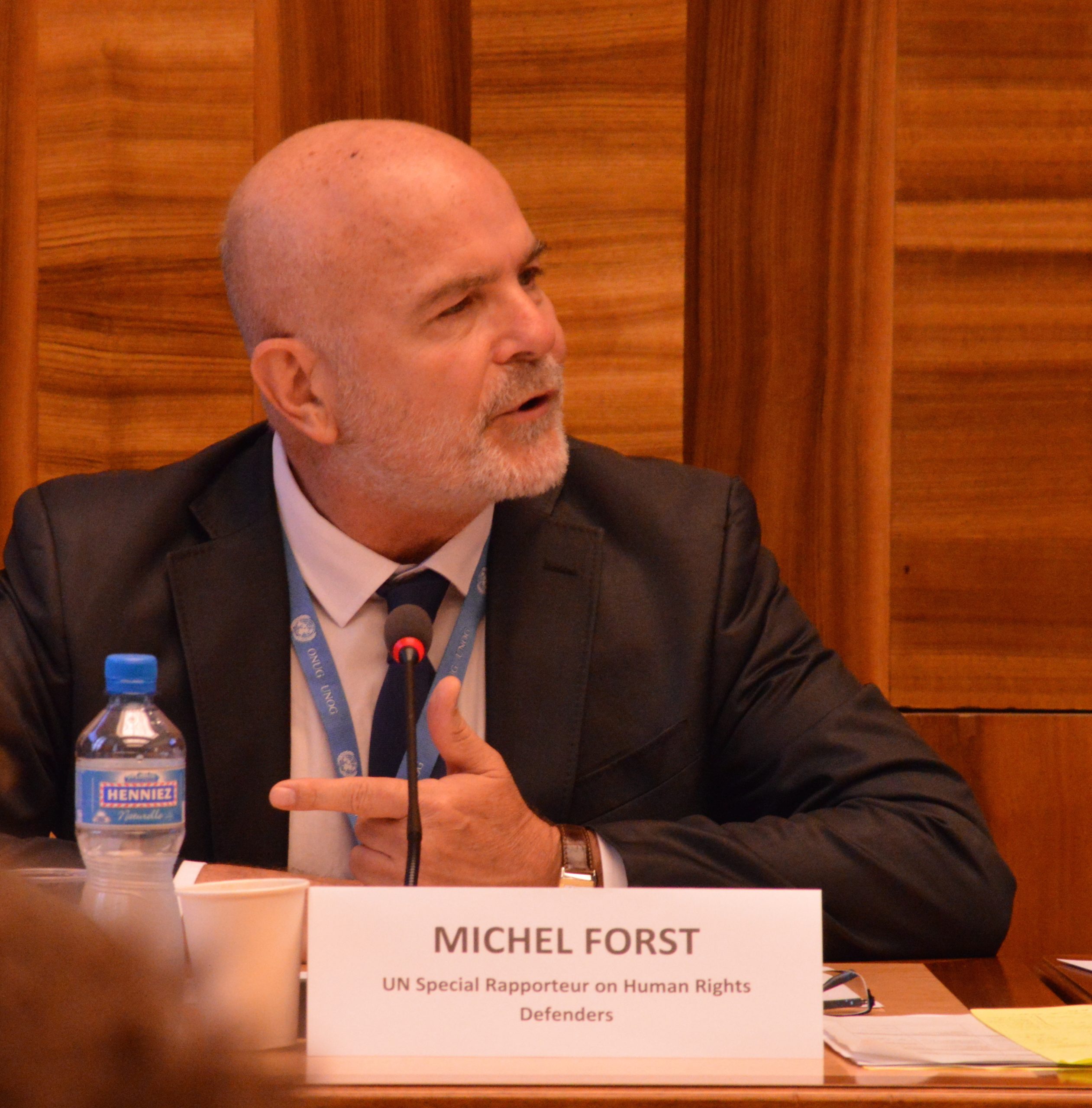
Michel Forst's vision as UN Special Rapporteur on human rights defenders
Michel Forst, in reflecting on his initial objectives as the then-newly elected UN Special Rapporteur on Human Rights Defenders, emphasises a preventative approach to safeguard defenders, advocating for supportive laws and policies against growing global challenges.
Michel Forst was appointed UN Special Rapporteur on Human Rights Defenders in June 2014. He is an experienced human rights lawyer, Secretary-General of France’s national human rights commission, former Board member of ISHR, former Director General of Amnesty International France, and a founding trustee and current Board member of Front Line Defenders. In this exclusive interview with ISHR, he sets out his vision and priorities in the post of Special Rapporteur.
‘While I have worked with civil society organisations for many years, my first activity in this mandate will be to convene a series of regional consultations with human rights defenders to identify key threats, challenges and opportunities for reform.’
Forst recognises that it is critical to engage directly with human rights defenders from all regions to identify both key thematic issues and trends and also to ensure an approach which responds to regional and national particularities and needs.
The first of these consultations was held in Geneva in June, with over forty defenders from all regions. Participants at that consultation identified a range of human rights defenders who face particular risks because of their identities or the nature of their work. ‘I heard a lot about the issues faced by defenders working on women’s rights and issues of sexual orientation and gender identity, land and environment rights, business and human rights, and issues of corruption and impunity,’ Forst says.
Participants also identified a number of key and emerging threats and restrictions to the work of defenders, ranging from use of force against peaceful protesters, to arbitrary detention, to defamation and smear campaigns, to online and offline surveillance, and the use and abuse of counter-terrorism laws and measures to silence dissent.
‘The first consultation organised by ISHR in Geneva was very useful,’ Forst says. ‘The further regional consultations will also be very important in identifying priorities for my mandate for the coming months and years and instructive in how I approach different defenders in different areas.’
‘I intend to promote a focus on prevention, ensuring that both State and non-State actors understand the importance of the work of defenders and develop laws and policies to promote and support rather than restrict and impede that work.’
In addition to focusing on the protection of defenders, Forst says he would like to strengthen the preventative focus of the mandate, building on the excellent work done by his predecessors, Hina Jilani and Margaret Sekaggya. This includes examining ways in which the UN Declaration on Human Rights Defenders is being implemented in national laws and policies.
‘It is important not only to denounce bad practice, but to promote examples of good practice,’ he says. ‘In that regard, I am interested to examine the effectiveness of human rights defenders laws and mechanisms recently enacted and established in places such as Mexico and Cote d’Ivoire.’ According to Forst, ‘The incorporation of the Declaration into national laws and policies is crucial to ensuring a safe and enabling environment for the work of human rights defenders.’
Forst also identifies an opportunity to strengthen collaboration with the Special Rapporteurs on Human Rights Defenders appointed by the African Commission on Human & Peoples’ Rights and the Inter-American Commission. ‘I have already met with representatives of the European Union to discuss on better ways to interact with them and look forward to coordinating closely both with other regional mechanisms and the various UN human rights mechanisms,’ he says. ‘As the former UN independent expert on human rights in Haiti, I know that positive interactions between country and thematic mandate holders can develop effective synergies to protect human rights defenders.’
‘My regional consultations will also target those defenders who are living in remote areas and do not have access to documents or to international organisations to make sure that at least they know of the UN Declaration.’
A key priority for Forst will be to promote dissemination and implementation of the UN Declaration on Human Rights Defenders, including throughout translation and distribution in additional foreign languages and its incorporation into domestic law. Recognising the power and reach of social media, Forst is also examining ways in which to use platforms such as Twitter and Facebook to reach, engage and communicate with human rights defenders. He is already active on Twitter, at @ForstMichel.
‘I would say that 80-90% of the information that we receive comes from civil society organisations. It is my intention to further cooperate with them and associate NGOs with the work that I am planning to develop.’
With his extensive background working with non-governmental organisations, Forst recognises the important and vital work of civil society organisations and activists in promoting and protecting human rights. He also recognises, however, that defenders increasingly face risks and threats in association with this work and is determined to use his mandate to prevent reprisals, promote accountability and combat impunity.
‘You see an increasing number of reprisals against defenders and currently the UN does not have an adequate mechanism to respond,’ Forst says. ‘The adoption of the resolution on reprisals that was passed in Geneva in September 2013 but subsequently blocked in New York is crucial,’ he says. ‘We need a high-level UN official appointed to increase pressure on governments to deal with reprisals.’
Photo: UN Photo/Jean-Marc Ferré
